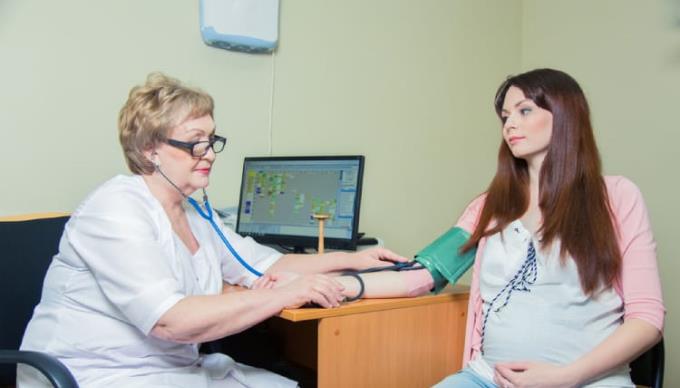During pregnancy, pregnant mothers are at risk of facing many dangerous medical conditions, including pre-eclampsia. The timely recognition of the signs of pre-eclampsia to help pregnant mothers can minimize the risk of bad.
Pre-eclampsia is an obstetric medical condition with many potential risks that seriously affect the health of mother and baby. This can happen in the second half of pregnancy and during the first few weeks of life. However, it occurs more commonly in the later stages of pregnancy.
In fact, if there are early signs of pre-eclampsia, the mother and baby themselves face many risks. According to obstetricians, an estimated 3-5% of pregnant women have pre-eclampsia. In this article, aFamilyToday Health will help you better understand pre-eclampsia and the signs for timely intervention.
What is preeclampsia?
Pre-eclampsia is a very serious obstetric disease syndrome that usually occurs in the second half of pregnancy (from 21 weeks onwards) with signs of damage to other organs, usually the liver and kidneys. , lungs. This condition is closely related to high blood pressure during pregnancy .
A slight rise in blood pressure can also be a sign of pre-eclampsia in pregnancy. If not treated in time, the pregnant mother can have eclampsia, stroke ... very dangerous to the lives of both mother and child.
7 signs of pre-eclampsia that pregnant mothers should pay attention to
1. Swelling in the face or hands
During pregnancy, if the mother is pregnant with swelling in her face, especially around her eyes or arms, great care is required. This could be a warning sign of a dangerous condition.
However, there is usually nothing to worry about when pregnant women have swelling in their legs or the rest of the body.
2. Rapid weight gain

During pregnancy, the weight gain of pregnant mothers will take place relatively slowly and evenly. So if you find yourself gaining weight too fast (1.5 - 2kg / week or 5kg / month) without specific reasons, go to the hospital to be examined and assessed by doctors.
3. A persistent headache
In fact, many pregnant women have headaches during pregnancy , some people have headaches more often than others.
In the event that you have had a headache and have taken painkillers but do not see any relief, do not hesitate to go to the hospital immediately.
4. Vision change or loss of vision
Change in vision and loss of vision are warning signs of danger during pregnancy that should not be ignored. Therefore, if the pregnant mother suddenly notices that she has dizziness or notices bright spots in her vision or loss of vision, notify your loved one and be taken to the hospital immediately.
5. Sudden nausea and vomiting
If you have gone through morning sickness and the vomiting stops but have suddenly felt nauseous or vomiting, pay attention. Sudden nausea and vomiting can be warning signs that you are experiencing pre-eclampsia in pregnancy.
6. Upper stomach pain
Do you have an upper stomach pain, but the cause is not heartburn, but not because of the ride? Take note as this can be a warning sign of pre-eclampsia. If the pain doesn't go away in a short time, go to the hospital.
7. Difficulty breathing
If you suddenly gasp, feel short of breath, short of breath ... go to the hospital for timely care. Sudden difficulty breathing can be a warning sign of a very dangerous pregnancy condition.
During pregnancy, if you find that you have 1 of the 7 signs above, you should contact the hospital immediately.
Complications of pre-eclampsia
Pre-eclampsia is a very serious condition that can be life-threatening for both mother and baby if left untreated. In addition, this condition can cause complications such as:
Bleeding problems due to low platelet count
The placenta has been removed (the placenta falls off the wall of the uterus).
Liver damage
CKD
Pulmonary edema
In addition, with babies born ahead of time, they can experience health complications.
How to limit the bad complications of pre-eclampsia?

The fact is that many women with pre-eclampsia don't have any warning symptoms. Therefore, to ensure the health of mother and baby during pregnancy, you should strictly follow the antenatal check-up schedule and instructions of your doctor.
During prenatal care, you will have blood pressure checked, urine test for protein, ultrasound to measure amniotic fluid and evaluate the health of the fetus. In addition, your doctor may recommend a blood test to see if your liver enzyme levels are abnormal and if your platelet count is low. In addition, pregnant mothers may also have to perform a non-stress test to monitor the fetal heart rate as the baby moves in the uterus.
Blood pressure of pregnant women is considered to increase when systolic blood pressure is greater than 140 and diastolic pressure is greater than 90 regardless of basal blood pressure. This increases the risk of stillbirth or premature birth, which is dangerous for both mother and baby.
If you are diagnosed at risk of pre-eclampsia, you will be closely monitored by the obstetrician. If you realize that there is an adverse risk that could seriously affect mother and baby, your doctor may order you to have your baby sooner than expected. At this time, measures to stimulate the induction of labor will be applied.
Pre-eclampsia can lead to eclampsia, stroke, and convulsions that cause death of mother or both mother and baby. In fact, pregnant women with pre-eclampsia can experience long-term health consequences. This is one of the risk factors for an increase in stroke, thyroid disease, the development of diabetes and future heart disease. Therefore, let your doctor know if you have one of the warning signs to come up with a plan to help prevent complications for you.













